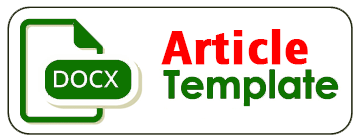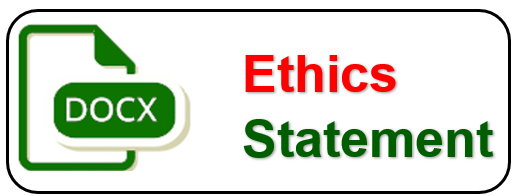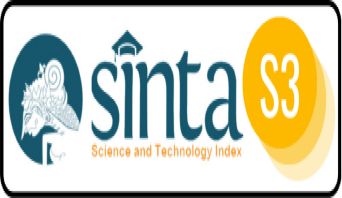POTENSI EKONOMI DAN PENGELOLAAN SAMPAH PASAR DI KOTA BANDAR LAMPUNG
DOI:
https://doi.org/10.26630/rj.v14i2.2189Keywords:
Solid waste, economic potential, Reuse, Reduce, RecycleAbstract
Market’s solid waste that has accumulated can cause air pollution in the form of an odor that disturbs market visitors, traders, and residents around the market. Solid waste that has accumulated is a breeding place for disease vectors, such as flies, cockroaches, and mosquitoes.
This research aims to solve the problem of market waste management in the city of Bandar Lampung. Primary data obtained from survey results and direct measurements, namely the volume of waste generation, type of waste, and the composition of waste. Secondary data were obtained from market managers.
Market waste management has not used the concept of waste reduction and waste management mandated in the Bandar Lampung City Laws and Regulations, the average amount of waste generation throughout the market is 46,747 kg/day, the average per day of each market ranges from 3,438 -11,703 kg/day. The type and composition of waste is an organic waste of 84.48% and inorganic waste of 15.52%. The economic potential of all market waste is Rp. 12,938,816/day or Rp. 388,164,480/month and Rp. 4,657,973,760/year.
It is necessary to plan 3R TPS and socialize waste management following the mandate of Law No. 18 of 2008 concerning Waste Management, as well as the Regional Regulation of the City of Bandar Lampung No. 5 of 2015 concerning Waste Management in the City of Bandar Lampung.Â
References
Dewi, R. S. (2008). Evaluasi Ekonomi Dan Sosial Unit Pengolahan Sampah ( Ups ) Kota Depok.
Doddy Ari Suryanto, D. S. (2005). Kajian potensi ekonomis dengan penerapan 3r (reduce, reuse dan recycle) pada pengelolaan sampah rumah tangga di kota depok. Prosiding Seminar Nasional PESAT, DEPOK, 17–28. https://core.ac.uk/download/pdf/143963687.pdf
Fauzi, A. (2006). Ekonomi Sumber Daya Alam dan Lingkungan : Teori dan Aplikasi. Gramedia Pustaka Utama.
Jazani, O. M., Rastin, H., Formela, K., Hejna, A., Shahbazi, M., Farkiani, B., & Saeb, M. R. (2017). An investigation on the role of GMA grafting degree on the efficiency of PET/PP-g-GMA reactive blending: morphology and mechanical properties. Polymer Bulletin, 74(11), 4483–4497. https://doi.org/10.1007/s00289-017-1962-x
Nugroho, A. S., Rahmad, R., & Suhartoyo, S. (2018). Pemanfaatan Limbah Plastik Sebagai Energy Alternatif. Simetris: Jurnal Teknik Mesin, Elektro Dan Ilmu Komputer, 9(1), 55–60. https://doi.org/10.24176/simet.v9i1.1772
Oswarii T, Suaryanto DA, S. D. (2006). Potensi Nilai Ekonomis Pengelolaan Sampah Di Kota Depok. Jurnal Ekonomi Bisnis, 2(11), 59–69.
Pemerintah Daerah Provinsi Lampung. (2015). Peraturan Daerah Kota Bandar Lampung Nomor 05 Tahun 2015, Tentang Pengelolaan Sampah.
Purwaningrum, P. (2016). Upaya Mengurangi Timbulan Sampah Plastik Di Lingkungan. Indonesian Journal of Urban and Environmental Technology, 8(2), 141. https://doi.org/10.25105/urbanenvirotech.v8i2.1421
Rahayu, D. E., & Sukmono, Y. (2013). Kajian Potensi Pemanfaatan Sampah Organik Pasar berdasarkan Karakteristiknya (Studi Kasus Pasar Segiri Kota Samarinda). Jurnal Sains &Teknologi Lingkungan, 5(2), 77–90. https://doi.org/10.20885/jstl.vol5.iss2.art2
Sugianti, I. G. A. N., & Trihadiningrum, Y. (2008). Definisi Tempat Pengolahan Sampah Terpadu. In Prosiding Seminar Nasional Manajemen Teknologi VII. Program Studi MMT-ITS, Surabaya.
UU No 8/2008, Undang-Undang Republik Indonesia Nomor 18 Tahun 2008 Tentang Pengelolaan Sampah.
Wahyono, S. (2018). Konsep pengelolaan sampah kota dan kaji terap teknologi pengelolaannya. Prosiding Seminar Nasional Dan Konsultasi Teknologi Lingkungan, 20 September 2018, 58–64.
Downloads
Published
How to Cite
Issue
Section
License
Copyright (c) 2021 Ruwa Jurai: Jurnal Kesehatan Lingkungan

This work is licensed under a Creative Commons Attribution-NonCommercial 4.0 International License.

Ruwa Jurai: Jurnal Kesehatan Lingkungan is licensed under a Creative Commons Attribution-NonCommercial 4.0 International License.
Authors who publish with this journal agree to the following terms:
- Authors retain copyright and grant the journal right of first publication with the work simultaneously licensed under a Creative Commons Attribution-Non Commercial License that allows others to share the work with an acknowledgment of the work's authorship and initial publication in this journal.
- Authors are able to enter into separate, additional contractual arrangements for the non-exclusive distribution of the journal's published version of the work (e.g., post it to an institutional repository or publish it in a book), with an acknowledgment of its initial publication in this journal.
- Authors are permitted and encouraged to post their work online (e.g., in institutional repositories or on their website) prior to and during the submission process, as it can lead to productive exchanges, as well as earlier and greater citation of published work.









